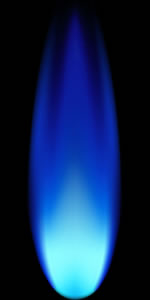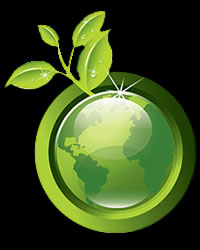The differences between Natural and Propane gas
Natural Vs. Propane Gas

Natural gas is made up of several gases including propane, butane, ethane but mostly consists of methane, while propane (aka lp gas) is a part of natural gas in its raw state. Propane is a hydrocarbon separated from the other gases at gas processing facilities. The propane that is separated during this process is stored and sold to propane dealers for end use by consumers.
To obtain an accurate cost comparison between the two fuels, the rates of your local gas and propane companies will differ and need to be taken into account when making a decision . While utility companies provide price per cubic foot, propane companies provide price per gallon. Natural gas availability will generally determine whether or not propane can be used because many municipalities will require the use of natural gas if a business or residence is within a certain distance of a natural gas main line.
Energy Efficiency and Cost Comparison

The cost comparison between propane and natural gas is much easier due to the fact that unlike electricity, natural gas and propane can be directly compared based on their individual BTU ratings. One cubic foot of propane equals 2,516 BTUs compared to one cubic foot of natural gas equaling 1,030 BTUs. Propane contains more than twice the energy of natural gas. A 100,000 BTU natural gas furnace burns around 97 cubic feet an hour while a propane furnace only burns about 40 cubic feet an hour.
For Example: If the natural gas price is $15.00 per 1,000 cubic feet, that $15.00 will purchase around one million BTU's, which compares to slightly over 11 gallons of propane. If propane costs $2.50 per gallon, than natural gas becomes the cheaper option even if propane delivers more BTU's per hour. Again, pricing in you locality will dictate which is the cheaper option but most of the time it is usually natural gas that wins out.
Environmental Impacts

Natural gas is categorized as a greenhouse gas, while propane is not. Propane is not toxic or damaging and will not harm the environment if it is released into the atmosphere. Propane is a green fuel before combustion and remains environmentally friendly even after use.
Keep in mind that the emissions comparison of propane vs. natural gas is fairly insignificant due to the cleanliness of each fuel. Propane and natural gas both exemplify clean burning characteristics with minimal harmful emissions and toxins. As a primary energy source, natural gas is sometimes used for large scale electricity generation, while propane is not.
Should I convert from one gas to another?

Before making this big decision, you need to consider the following important factors:
- The total costs of converting all of your appliances to a new fuel type.
- Digging up your yard or garden to safely remove the propane line and install a natural gas line.
- Removing and properly disposing of your propane tank.
- With natural gas, there’s no need to schedule a delivery, it's always available.
- You only pay after you use the natural gas, since there is no fuel stored in a tank for future use.
- During a power outage, most natural gas appliances will still function.